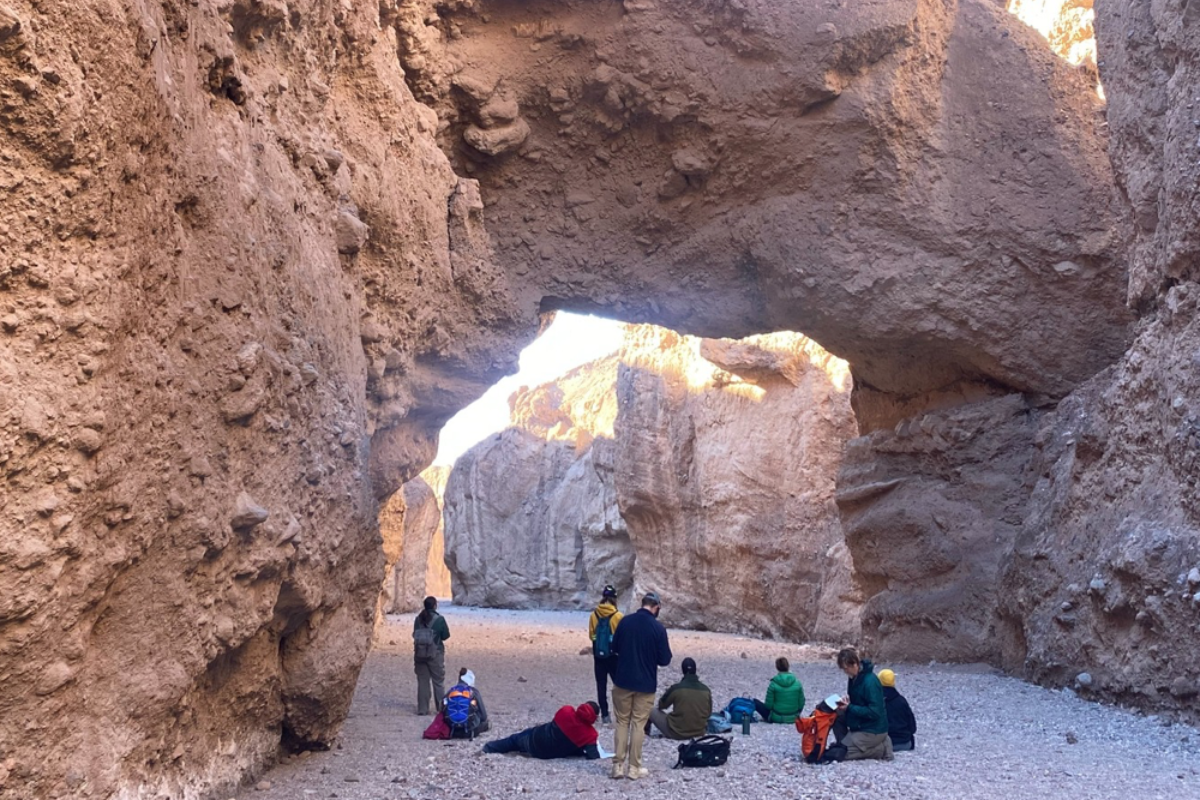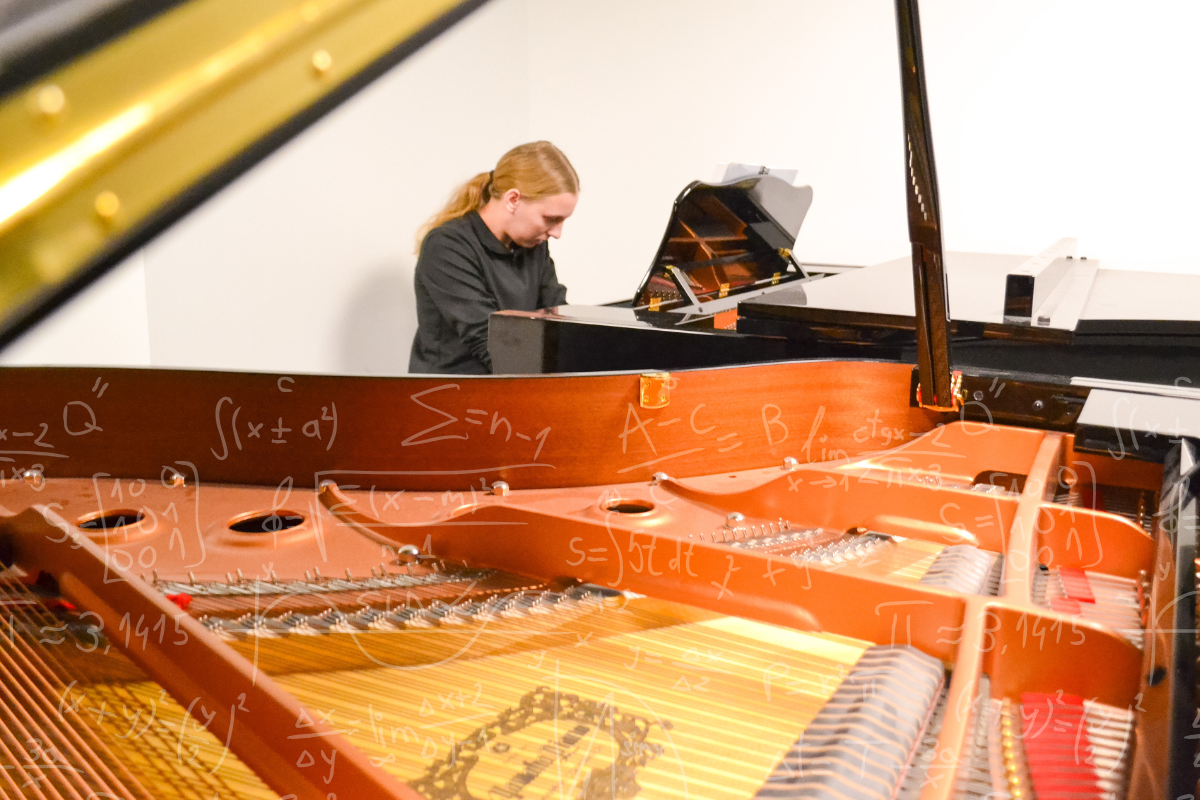Highlights:
-
Bats play pivotal roles in ecosystems by regulating insect populations and pollinating plants, making their conservation crucial for Nebraska agriculture.
-
Biology assistant professor Han Li, Ph.D., and graduate assistant Evan Wigley received Mutual of Omaha’s Wild Kingdom grant, marking a significant milestone for their urban bat conservation research.
-
Their findings hold the potential to inform policy decisions and conservation strategies nationwide, offering practical insights into bringing together urban development and wildlife preservation.
It’s after midnight in the heavily wooded area of the Glacier Creek Preserve just outside of Omaha, Nebraska. Han Li, Ph.D., is working diligently with the aid of his headlamp and the last bit of daylight to set up a net that is invisible to the human eye. Li waits patiently, sometimes until the early hours of the morning, waiting for one thing: bats.
The next day, Li’s graduate assistant, Evan Wigley, will return to the field when the grass is still damp with the early morning dew to collect data and maintain the team’s equipment.
Li, an assistant professor of biology at UNO, has been studying bats for nearly a decade.
He has always been interested in the effects of urbanization on wildlife, but found himself particularly drawn to bats because of their nocturnal nature. Li stated that pursuing this research aligned best with his lifestyle, joking that he himself is nocturnal.
Li and Wigley's current research delves into the complexities of urban bat conservation in Nebraska's evolving landscape.
Bats play pivotal roles in ecosystems by regulating insect populations and pollinating plants, making their conservation crucial. Employing innovative methodologies, their study explores bat behavior, habitat preferences, and population dynamics amidst urban challenges.
"The reason bats are crucial, especially in the Midwest, is due to our strong agricultural industry. In agriculture, pests pose significant threats, and North American bats, being largely insectivorous, play a vital role in controlling these pests,” said Li. “This is particularly important for our region.”
Li added that bats serve as pollinators for many essential plants, such as agave used in tequila production, and traditional crops like bananas and cacao. He noted their role in pollination is “indispensable across various agricultural sectors."
Li and Wigley began their first field season together during the summer of 2023 with the goal of their research being to promote bat conservation in Nebraska. Wigley, currently pursuing a master’s degree in biology at UNO, brings both enthusiasm and technical expertise to their collaborative effort.
Each week, Wigley visits the field sites, where he collects bat detectors that have been placed at the top of flagpoles. Once Wigley reaches the top of the poles, he gathers the recordings located inside of the devices, replaces them with new ones, and replaces the batteries. These detectors collect audio that can be used by the researchers to determine what species of bats have been in the area.
For Wigley, the opportunity to work alongside Li represents more than academic pursuit. It’s a chance to contribute firsthand to groundbreaking research that aims to shape conservation practices in urban settings.
"I think the skills and experiences I've had at UNO so far will really help me in my future career. I've learned a lot of technical skills, working in both lab and field settings. Being in the field has given me valuable hands-on experience—planning ahead, making sure all equipment is ready,” said Wigley. “It's about being prepared. Networking and effectively communicating with people, explaining my research to those less familiar with it, have also been crucial skills I've developed."
This summer, after a rigorous application process, Li and Wigley received Mutual of Omaha’s Wild Kingdom Grant, which aims to support university efforts to carry out research, restore habitats, and promote conservation education for threatened and endangered species in their communities. UNO was one of seven universities awarded the grant and the only recipient in Nebraska.
Securing support from Mutual of Omaha's Wild Kingdom Grant Program marks a significant milestone for Li and Wigley's research endeavors. This collaboration, backed by the National Wildlife Federation, not only funds critical studies but also amplifies UNO's impact in wildlife conservation.
“Through this grant, we can generate stronger evidence for grassland restoration. It's a perfect opportunity for comparison-based, experiment-based research. However, after the acceptance, the real work begins. It's about making sure we do the best job we can for any scientific research,” said Li. “Now that we have the funding, we need to ensure we use it effectively to generate the most impact. We have to start thinking about where to sample, how to find new sites, and what adjustments to make based on previous data. It's all about improving the research, planning the project, and managing every aspect of it.”
Li and Wigley's research extends beyond academic curiosity. Their findings hold the potential to inform policy decisions and conservation strategies nationwide, offering practical insights into bringing together urban development and wildlife preservation.
Looking ahead, their team envisions implementing sustainable practices that foster resilient urban ecosystems, setting an example for including conservation in city planning.
"The principles we generate from the knowledge we have can be applied everywhere,” said Li. “We also hope to provide strong evidence to support conservation tools. In simple terms, we aim to offer the best tools available for bat conservation—tools backed by science and actual evidence demonstrating their effectiveness. Everything my lab is doing and everything in my research program has the end goal of providing evidence to support any tools we develop for bat conservation.”






